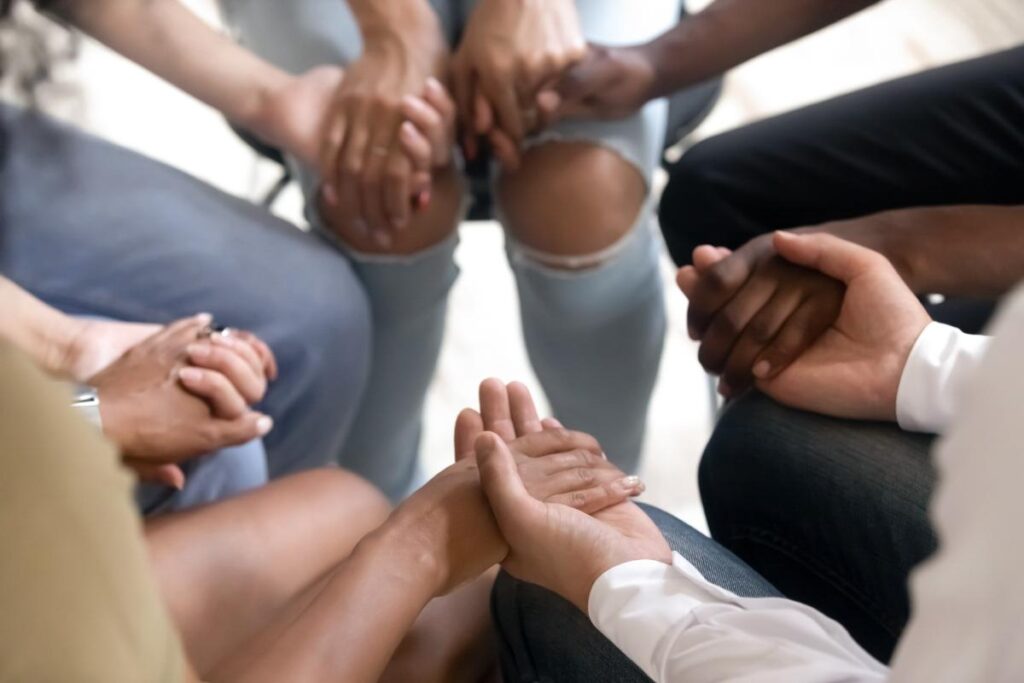[vc_row][vc_column][vc_column_text]12-step fellowships help people who are struggling with addiction change their lives. Beginning in 1935 with Alcoholics Anonymous (AA)—a program to help people in recovery from alcohol use disorder—12-step fellowships have become a standard for helping those struggling with addiction. Dozens of programs, such as Narcotics Anonymous (NA), use the same principles as AA to help people all over the world.
12-step programs provide steps for recovery. Each member of the group works these steps with a sponsor, who provides insight and guidance. This process is helpful not only for recovery, but for building a better life.
The steps of Alcoholics Anonymous are as follows:
- We admitted we were powerless over alcohol—that our lives had become unmanageable.
- Came to believe that a Power greater than ourselves could restore us to sanity.
- Made a decision to turn our will and our lives over to the care of God as we understood Him.
- Made a searching and fearless moral inventory of ourselves.
- Admitted to God, to ourselves, and to another human being the exact nature of our wrongs.
- Were entirely ready to have God remove all these defects of character.
- Humbly asked Him to remove our shortcomings.
- Made a list of all persons we had harmed, and became willing to make amends to them all.
- Made direct amends to such people wherever possible, except when to do so would injure them or others.
- Continued to take personal inventory and when we were wrong promptly admitted it.
- Sought through prayer and meditation to improve our conscious contact with God, as we understood Him, praying only for knowledge of His will for us and the power to carry that out.
- Having had a spiritual awakening as the result of these Steps, we tried to carry this message to alcoholics, and to practice these principles in all our affairs.
For other 12-step fellowships, the language is altered to fit the specific addiction, but the steps are essentially the same. For instance, in Narcotics Anonymous, instead of, “We admitted we were powerless of alcohol,” the wording is, “We admitted we were powerless over our addiction.”
The fellowship part of 12-step programs are the meetings, in which people come together to share their experiences. There are commonalities between all meetings, but no two are the same. Some focus on a particular step. Some focus on a topic of interest to the group members. Some are speaker’s meetings, in which one or two people are chosen to share their experience, strength, and hope. There are AA meetings devoted to discussing the Big Book, a treatise on recovering from alcohol use disorder.
There are all sorts of groups for specific populations, such as LGBTQIA meetings, 12-step fellowships for women, meetings for young adults, fellowships for people who work in the restaurant industry, and much more. Whatever group you’re looking for, it’s likely you’ll find it.
12-step fellowships not only help people get and stay sober; they provide the tools to build a meaningful life in recovery. They offer those entering recovery a support system of other sober folks who are experiencing this journey alongside them.
To find a fellowship near you, search any of the below sites, or google specific needs like “AA meetings for women near me.”
Alcoholics Anonymous: https://www.aa.org/
Narcotics Anonymous: https://na.org/
Cocaine Anonymous: https://ca.org/
Crystal Meth Anonymous: https://www.crystalmeth.org
Pills Anonymous: https://www.pillsanonymous.org
Dual Recovery Anonymous: http://draonline.org[/vc_column_text][/vc_column][/vc_row]








